Most gymgoers think the secret to a killer leg routine is spending countless hours in the gym, punishing your lower body until you can barely walk.
But what if I told you that the hardest leg workouts aren’t always the most effective? That you don’t need to grind through endless sets to build lower body mass?
The truth is, so long as you organize the right leg exercises into a well-structured full leg day workout, you can build the muscular lower body you’ve always wanted without saddling yourself with excessive fatigue.
Using this approach not only maximizes muscle growth but keeps you fresh enough to perform at your best in your next heavy leg day workout.
In this article, you’ll learn how to craft an intense leg workout that delivers maximum results with minimum wasted effort. You’ll also discover the most killer leg exercises for lower body mass, tips to ensure each workout leaves you bigger and stronger, and more.
Key Takeaways
- The most effective leg workouts deliver maximum results with minimal wasted effort—they don’t have to be brutally long to build muscle.
- To build a muscular lower body, do exercises lie the back squat, RDL, lunge, leg curl, goblet squat, and calf raise.
- To get the most out of killer leg workout, train close to failure and strive to get stronger over time.
- To gain muscle, eat about 10% more calories than you burn each day and aim for at least one gram of protein per pound of body weight.
- To maximize your killer leg workout results, consider using a high-quality protein powder to help you reach your daily protein target, creatine to support recovery and muscle growth, and a pre-workout to enhance energy, focus, and performance.
Killer Leg Workout for Lower Body Mass
Barbell Back Squat
Sets: 3 | Reps: 4-to-6 | Rest: 3-to-5 min
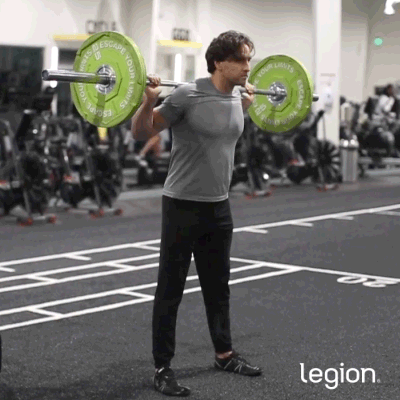
All good heavy leg day workouts revolve around the barbell back squat because it allows you to lift big weights safely and progress regularly, making it ideal for gaining lower body mass and strength.
How to:
- Position a barbell in a squat rack at about the height of the top of your breastbone.
- Step under the bar, pinch your shoulder blades together, and rest the bar directly above the bony ridges on the bottom of your shoulder blades.
- Lift the bar out of the rack, take one or two steps backward, and place your feet flat on the floor a little wider than shoulder-width apart, with your toes pointing slightly outward.
- Sit down until your thighs are parallel to the floor, keeping your back straight and your knees in line with your toes.
- Stand up and return to the starting position.
Common Mistake: To prevent your knees from caving in as you stand up, imagine spreading the floor apart with your feet by driving your feet into the ground and away from each other (though they shouldn’t actually move). Doing so increases glute activation and enables you to lift more weight with a lower risk of pain or injury.
Romanian Deadlift
Sets: 3 | Reps: 4-to-6 | Rest: 3-to-5 min
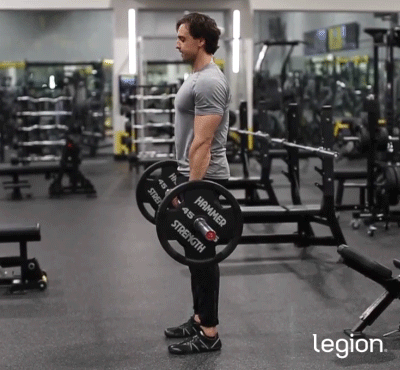
Many muscular leg workouts overemphasize the quads because they’re the leg muscles most visible in the mirror. But if you want truly massive legs, you can’t neglect your hamstrings and glutes. That’s where the Romanian deadlift stands out. It adds mass to your entire posterior chain (the muscles on the back of your body) without fatiguing you as much as other deadlift variations.
How to:
- Stand up straight holding a loaded barbell with a shoulder-width, overhand grip (palms facing toward your body).
- Flatten your back and lower the weights toward the floor in a straight line while keeping your legs mostly straight, allowing your butt to move backward as you descend.
- Once you feel a stretch in your hamstrings, bend your knees slightly more, and continue lowering the weights until your lower back begins to round—just below the knees for most people and about mid-shin for those who are particularly flexible.
- Squeeze your glutes and reverse the movement to return to the starting position.
Common Mistake: Letting the barbell drift from your body heightens the chances of back rounding, which can lead to injury. The best ways to avoid this are to focus on dragging the bar up your body and contracting your upper back and lats throughout each rep.
Dumbbell Lunge
Sets: 3 | Reps: 6-to-8 | Rest: 3-to-5 min
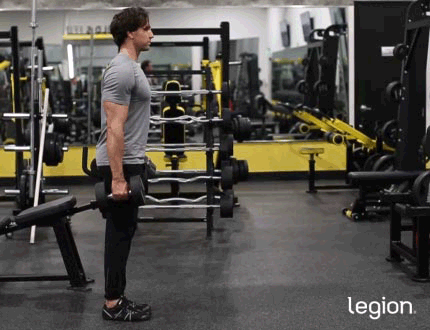
The lunge trains your entire lower body, making it a killer leg exercise for a full leg day workout. It’s also beneficial because it trains a single leg at a time, which helps you add symmetrical mass to your lower body.
The regular forward lunge is the best option for building overall leg muscle. However, if you want to emphasize your glutes, opting for the reverse lunge may be more fitting.
How to:
- Holding a dumbbell in each hand, stand up straight with both feet about shoulder-width apart.
- Take a long step forward with your right foot—about two to three feet—and plant your right foot flat on the floor. With most of your weight on your front foot, kneel down until your left knee touches the floor.
- Reverse the motion by pushing off the floor with your front foot and leaning slightly backward, allowing your legs to straighten.
- Once you’re standing, bring your right foot back to the starting position.
Common Mistake: Lunging with your feet almost in line with each other makes balancing more difficult. Avoid this by ensuring your feet stay about hip-width apart throughout the exercise.
Leg Curl
Sets: 3 | Reps: 8-to-10 | Rest: 2-to-3 min
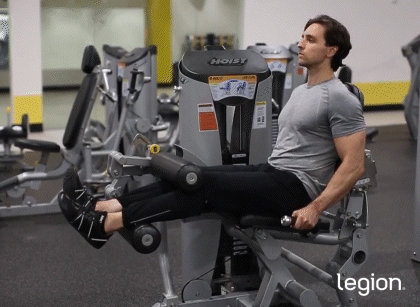
Leg curls are an outstanding addition to an intense leg workout because they’re highly effective for training the biceps femoris and semitendinosus, two muscles that when well-developed add significant mass to your thighs.
How to:
- Adjust the leg pad so that it rests against your mid-calf when you lie on the machine.
- Lie face down on the machine and grab the handles, then curl the pad toward your butt by pushing against the leg pad.
- Reverse the movement and return to the starting position.
Common Mistake: Many people curl their feet toward their butt with control but let the weight yank their legs back to the starting position, robbing them of some of the muscle-building benefits of the exercise. Avoid this by completing the lifting and lowering portion of each rep with control.
Goblet Squat
Sets: 3 | Reps: 10-to-15 | Rest: 2-to-3 min
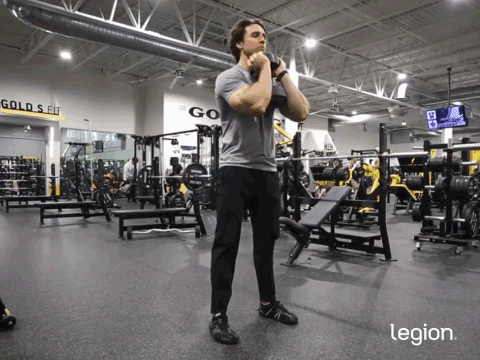
Many weightlifters think of the goblet squat as a beginner exercise that has no place in a hard leg workout. I disagree—it’s an excellent addition to a killer leg routine because it allows you to do extra volume for your legs without putting much strain on your knees or lower back.
How to:
- Hold a dumbbell in front of your chest with both hands.
- Place your feet a little wider than shoulder-width apart, point your toes out to the side at about a 45-degree angle, raise your chest, and sit down.
- Remember to keep your back straight and push your knees out in the same direction as your toes throughout each rep.
- Stand up and return to the starting position.
Common Mistake: Holding the weight away from your body forces your biceps, forearms, and shoulders to bear weight, which makes balancing more challenging and limits the amount of weight you can lift. Correct this by holding the weight close to your chest with your elbows fully bent.
Standing Calf Raise
Sets: 3 | Reps: 10-to-15 | Rest: 2-to-3 min
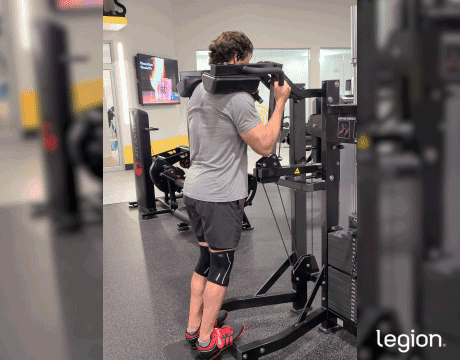
The standing calf raise emphasizes the gastrocnemius, the calf muscle most responsible for adding mass and shape to your lower legs.
How to:
- Place the balls of your feet on the footplate and crouch slightly so that the shoulder pads rest on your shoulders.
- Stand up straight so that your body is supporting the weight.
- While keeping the balls of your feet on the footplate, lower the weight as far as possible by lowering your heels toward the floor.
- Push through the balls of your feet to elevate the shoulder pads as high as you can, and then lower your heels to return to the starting position.
Common Mistake: Many people cut the range of motion short on the standing calf raise. Avoid this by lowering your body until you feel a deep stretch in your calf, hold it for a beat, then press through the ball of your foot and return to the starting position.
3 Tips to Guarantee a Killer Leg Workout
Train with the right intensity.
To maximize the muscle- and strength-building effects of this killer leg workout, push most sets close to muscle failure.
After each set, ask: “How many more reps could I have gotten with good form?” If the answer is more than two, increase the weight or reps to make your next set more challenging.
To maintain optimal intensity, you also need to increase the weights you lift as you get stronger. Do this by increasing the weights once you hit the top of your rep range for one set.
For example, if your workout calls for 4-to-6 reps of squats and you get 6 reps for a set, add 10 pounds total for your next set and work with that weight until you can (eventually) squat it for a set of 6 reps, and so forth.
If you get 3 or fewer reps after adding weight, reduce it by 5 pounds to remain within your target rep range (4-to-6) for all three sets.
Apply this progression method to all exercises in every workout.
Eat enough calories and protein.
To maximize muscle and strength gain, maintain a daily calorie surplus of around 110% of your total daily energy expenditure (TDEE).
You also need to eat enough protein to allow your leg muscles to recover, repair, and grow effectively. Aim to eat at least one gram of protein per pound of body weight per day.
Take the right supplements.
Here are the best supplements for boosting your performance and gains from this killer leg workout:
- Protein powder: Protein powder, such as whey or casein, provides your body with the nutrients needed to build muscle tissue and recover from workouts. For a clean and delicious protein powder, try Whey+ or Casein+.
- Creatine: Creatine boosts muscle and strength gain, improves anaerobic endurance, and reduces muscle damage and soreness from your workouts. For a natural source of creatine, try our creatine monohydrate, creatine gummies, or Recharge.
- Pre-workout: A high-quality pre-workout enhances energy, mood, and focus, increases strength and endurance, and reduces fatigue. For a top-tier pre-workout containing clinically effective doses of 6 science-backed ingredients, try Pulse with caffeine or without.
(If you’d like even more specific advice about which supplements you should take to reach your health and fitness goals, take the Legion Supplement Finder Quiz, and in less than a minute, you’ll know exactly what supplements are right for you.)
Scientific References +
- Neto, Walter Krause, et al. “Gluteus Maximus Activation during Common Strength and Hypertrophy Exercises: A Systematic Review.” Journal of Sports Science & Medicine, vol. 19, no. 1, 24 Feb. 2020, pp. 195–203, www.ncbi.nlm.nih.gov/pmc/articles/PMC7039033/.
- Alkjaer, Tine, et al. “Computational Modeling of a Forward Lunge: Towards a Better Understanding of the Function of the Cruciate Ligaments.” Journal of Anatomy, vol. 221, no. 6, 11 Oct. 2012, pp. 590–597, https://doi.org/10.1111/j.1469-7580.2012.01569.x.
- Yanagisawa, Osamu, and Atsuki Fukutani. “Muscle Recruitment Pattern of the Hamstring Muscles in Hip Extension and Knee Flexion Exercises.” Journal of Human Kinetics, vol. 72, no. 1, 31 Mar. 2020, pp. 51–59, https://doi.org/10.2478/hukin-2019-0124.
- Miyamoto, Naokazu, and Shingo Oda. “Mechanomyographic and Electromyographic Responses of the Triceps Surae during Maximal Voluntary Contractions.” Journal of Electromyography and Kinesiology, vol. 13, no. 5, Oct. 2003, pp. 451–459, https://doi.org/10.1016/s1050-6411(03)00058-0.
- Helms, Eric R, et al. “Evidence-Based Recommendations for Natural Bodybuilding Contest Preparation: Nutrition and Supplementation.” Journal of the International Society of Sports Nutrition, vol. 11, no. 1, 12 May 2014, https://doi.org/10.1186/1550-2783-11-20.
- Stokes, Tanner, et al. “Recent Perspectives Regarding the Role of Dietary Protein for the Promotion of Muscle Hypertrophy with Resistance Exercise Training.” Nutrients, vol. 10, no. 2, 7 Feb. 2018, p. 180, www.mdpi.com/2072-6643/10/2/180/pdf.










